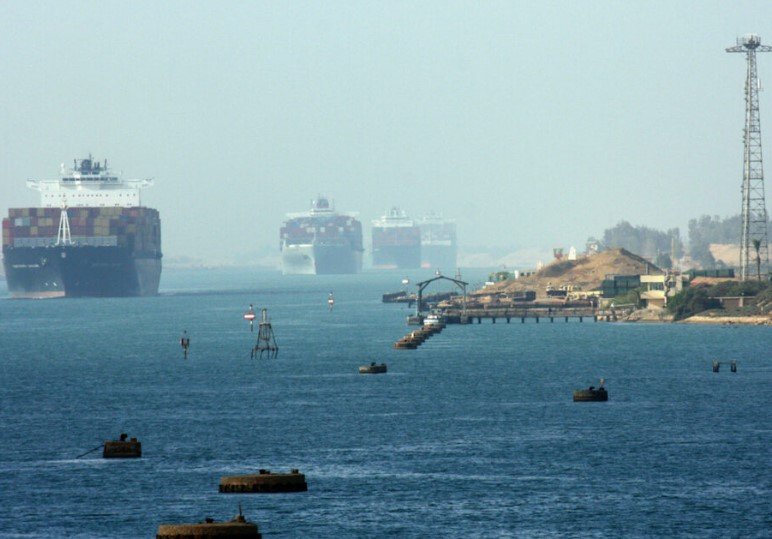Legal Experts, Political Leaders, and Citizens Decry Trump’s Remarks as Threat to International Order
U.S. President Donald Trump’s recent call for the free passage of American military and commercial vessels through the Suez Canal has sparked widespread backlash in Egypt. Legal scholars, political figures, and ordinary citizens have raised alarm over what they deem as baseless and dangerous claims, asserting that Trump’s remarks pose a serious threat to international law and order.
On Saturday, Trump took to his Truth Social platform, where he owns a majority stake, to declare that U.S. vessels should be allowed to pass through both the Panama and Suez Canals without paying fees. His comments came as part of a broader argument that the U.S. had been instrumental in making both canals viable and should therefore enjoy unrestricted access. He even claimed that the Suez Canal “would not exist” without the support of the United States and instructed Secretary of State Marco Rubio to address the issue immediately.
This proposal has drawn heavy criticism from Egypt, with experts pointing out the legal and diplomatic implications of such a claim. Ayman Salama, a professor of international law at Cairo University, was quick to point out the historical and legal context surrounding the Suez Canal. “Trump’s proposals about international waterways constitute a serious threat to international peace, security, and public order,” Salama stated in an interview with Xinhua.

The Suez Canal, a vital shipping route that connects the Mediterranean Sea to the Red Sea, has been governed by the 1888 Constantinople Convention, which guarantees freedom of passage for ships of all nations but also ensures the sovereignty of Egypt as the controlling state. According to Salama, Trump’s assertions disregard this long-standing agreement and the fundamental principles that safeguard the rights of all nations to use the canal without interference.
Salama further stressed that Trump’s remarks could undermine the stability of international trade and commerce by setting a dangerous precedent for U.S. interference in global governance. He described the proposal as a violation of contemporary international law, particularly the principle of non-interference in the internal affairs of sovereign nations.
Egyptian leaders, who consider the Suez Canal a key economic asset, were quick to denounce Trump’s remarks. The Suez Canal Authority, which operates the waterway, issued a statement emphasizing that the canal is a vital artery for global trade and should remain a neutral space, open to all nations under the protection of international law.
Egyptian citizens also voiced their opposition to Trump’s statement, many viewing it as an affront to Egypt’s sovereignty. “The Suez Canal is a national treasure, and no country, including the United States, can dictate how we manage it,” said Ahmed Al-Masry, a local Cairo resident. “We must defend our rights and the international agreements that govern such critical routes.”
Trump’s call for free passage could also have far-reaching effects on diplomatic relations between Egypt and the United States. Egypt, which relies heavily on revenue from the Suez Canal, would find such a move not only financially damaging but also politically problematic. The Suez Canal’s revenue is a crucial part of Egypt’s economy, contributing billions of dollars each year.
The backlash is not just limited to legal experts and political leaders. Global shipping industries have also taken note of the controversy, warning that the proposal could destabilize the international shipping community. If implemented, the move could disrupt the flow of goods through one of the world’s most important trade routes, potentially triggering economic consequences far beyond Egypt’s borders.
International law experts are urging global leaders to stand firm in protecting the principles established in the Constantinople Convention and to prevent any unilateral action that would undermine the sovereignty of nations like Egypt. The international community must unite to safeguard the legal frameworks that ensure the fair use of international waterways and prevent any one nation from imposing its will on critical global infrastructure.
In the meantime, the debate over the future of the Suez Canal and U.S. influence on global shipping routes is likely to intensify. As the controversy unfolds, all eyes will be on how Egypt and the international community respond to Trump’s call and whether it leads to further diplomatic tensions or legal challenges.
